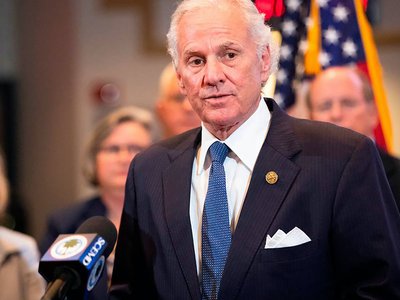Out-of-work Kansans desperate for unemployment checks still can’t get through, but scammers are making off with what may be untold millions in fraudulent claims. What in heaven’s name is going on?
The Kansas Department of Labor isn’t saying yet how much unemployment fraud has cost the state. But Rep. Sean Tarwater, a Stilwell Republican who chairs the House Commerce Committee, says industry professionals estimate it could be as much as $400 million.
Bipartisan anger mounted in the Legislature in recent days, and news went national over the historic levels of fraud and failure at the Kansas Department of Labor. Indeed, Gov. Laura Kelly announced the unemployment system will shut down Saturday to Tuesday to install anti-fraud technology.
The department has struggled to find out just how many fraudulent claims have been paid out. But here are two possible signs that the fraud may be scandalously large: Initial filings for jobless benefits were thought to have surged by more than 76,000 the week of Jan. 16 — tens of thousands above those at the start of the year. And that would put Kansas second only to California in new claims, Tarwater says.
“Kansas is the last state to address this fraud and, as a result, we have become the fraudster’s No. 1 target,” he says.
The Department of Labor, Tarwater says, “won’t say how many fraudulent claims have been paid, how many dollars have been squandered in fraudulent payments or what steps they will take to stop it. Either they are completely incompetent, or they know the magnitude of the problem and want to hide it.
“We have a little over 1.1 million workers and have had over 1 million initial claims. These numbers do not add up.”
However deep it is, the fraud is also incredibly brazen: The Star Editorial Board has confirmed that a dozen gainfully employed workers in Kansas’ own secretary of state’s office have had fraudulent unemployment claims filed in their names. That’s just one office in the state’s own bureaucracy. How many other fraudulent claims are going out undetected?
Making matters worse, the secretary of state’s office had previously warned the Department of Labor of the fraud — but was still billed for some of the fake claims anyway. The bills have since been withdrawn.
It’s certainly true that unemployment fraud is hitting a number of states hard. Fraudulent claims in California are said to be between $11 billion and $31 billion. But as of this writing, Kansas still hasn’t settled on how much fraud it has paid out.
Ryan Wright, special assistant to the secretary of labor, disputed Tarwater’s numbers, saying $400 million in fraud is just a guess — and saying even the announced 76,000 in new jobless claims was an error in reporting. It has been revised down to just over 40,000.
Wright said the state and nation are dealing with identity theft on an unprecedented scale. But he noted that Missouri is handling it better than Kansas because of its more modern computer systems. He said the Kansas Department of Labor has expanded its call center from 20 to 450 — but with some 250,000 calls on Monday alone, the department would need 1,500 operators to handle the load. Regardless, he said the department has blocked some 250,000 fraud attempts.
Still, here’s another sign how bad the fraud might be: Legislators are considering a bill to hold businesses, public entities, nonprofits and others harmless for fraudulent claims in their name.
In fairness to the governor and the Department of Labor, the department’s computer systems are four decades old and in frenzied need of replacement. The governor is seeking $37 million to do so.
Still, we’re nearly a year into the COVID-19 pandemic, and many months into what has been a chronic crisis at the Department of Labor. And it’s been half a year since the resignation of Labor Secretary Delia Garcia in June, after her department sent out $7 million in duplicate benefit payments to 4,500 recipients — and then took the money back, causing bank overdrafts for an untold number of Kansans.
We understand the system is overwhelmed. But the amount of fraud needs to be determined and prevented going forward, and the truly deserving need their payments.
The state’s out-of-work residents, and history, are watching very closely now.
Kansas unemployment crisis: Jobless can’t get through to the state, but scammers can
Out-of-work Kansans desperate for unemployment checks still can’t get through, but scammers are making off with what may be untold millions in fraudulent claims.






